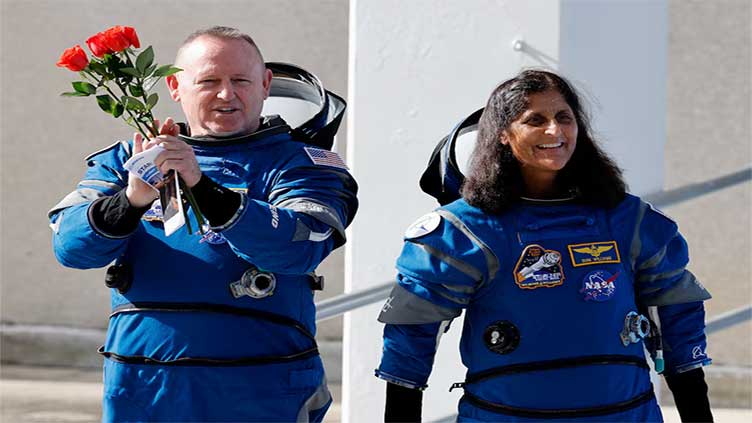Who are the first astronauts to fly aboard Boeing's Starliner?

Technology
Wilmore, 61, is a retired US Navy captain, completed four operational deployments flying fighter jet
(Reuters) – Two veteran NASA astronauts with a combined 500 days of previous spaceflight were the first crew launched into space on Boeing's Starliner space capsule, in a June 5 test flight from Florida. They had been scheduled to return in about eight days.
Now Barry "Butch" Wilmore and Sunita "Suni" Williams, both former military test pilots, will not return to Earth until early next year on a SpaceX vehicle. NASA has deemed issues with Starliner's propulsion system too risky to carry its first crew home as planned.
The Starliner capsule sprang leaks and some of its thrusters failed, so their mission at the International Space Station has been extended by months.
Here are more details about the astronauts:
* Wilmore, 61, a retired US Navy captain, completed four operational deployments flying fighter jets off the decks of aircraft carriers, including 21 combat missions during the first US Gulf War in the 1990s. He also served as a Navy test pilot and flight instructor before joining the NASA astronaut corps in 2000.
He first flew to the space station as a NASA space shuttle pilot in 2009, and returned to the orbiting laboratory in 2014 - launched aboard a Russian Soyuz spacecraft with two cosmonauts - for a long-duration mission, including several months as station commander.
Before his Starliner mission, Wilmore had logged 178 days in space and completed four spacewalks.
A Tennessee native who played college football while attending Tennessee Tech University, Wilmore holds advanced degrees in electrical engineering and aviation systems. He is married with two daughters.
* Williams, 58, a former Navy helicopter pilot with experience flying more than 30 different rotary aircraft, was deployed as part of a helicopter combat support squadron during the first Gulf War. She later flew in support of Navy disaster relief operations in Florida following Hurricane Andrew.
She returned to the naval test pilot school as a rotary aircraft instructor before being selected for the NASA astronaut program in 1998.
Like Wilmore, Williams first flew to the space station aboard a space shuttle and made a return visit as a Soyuz passenger riding along with two cosmonauts. Both her ISS tours – in 2006-2007 and in 2012 – were long-duration science expeditions.
After two stays aboard the outpost, Williams had set a world record for the most time spent by a woman in orbit outside a spacecraft, logging a total of 50 hours and 40 minutes combined during seven spacewalks. Her record has since been surpassed by fellow astronaut Peggy Whitson.
During her second ISS mission in 2012, Williams became only the second woman designated as commander of the station.
An avid athlete, Williams in 2007 became the first person to complete a marathon in space, competing virtually in the Boston Marathon from orbit on the space station's treadmill to go the distance in four hours and 24 minutes.
Taking the concept to the next level, Williams in 2012 completed the first triathlon in space, again using the treadmill and a stationary bicycle, then performing a mix of weight-lifting and resistance exercises on a fitness machine that approximated swimming in microgravity.
Before her Starliner mission to ISS, Williams had spent a total of 322 days in space. She also made history as the first woman on the inaugural crewed flight of a new orbital spacecraft.
Born in Massachusetts, Williams currently resides in Houston with her husband, a federal police officer who also flew helicopters earlier in his career.


